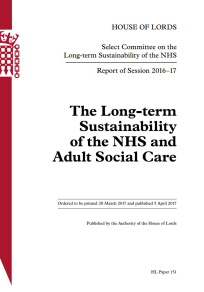News / Calls for independent long-term planning body
A report from the Lords Select Committee on the Long-term Sustainability of the NHS condemns a ‘culture of short-termism’ in the NHS and adult social care, with the Department of Health ‘unwilling or unable to look beyond the next few years’. 
The peers called for a new independent Office for Health and Care Sustainability to be established to examine health and care needs over the next 15-20 years – a health version of the Office for Budget REsponsibility. The body would report to Parliament on ‘the impact of changing demographic needs, the workforce and skills mix in the NHS and the stability of health and social care funding relative to demand’.
This should be a step towards creating an ‘achievable’ political consensus on the future of the health and care system.
The committee criticised past funding for being ‘too volatile and poorly coordinated between health and social care’ resulting in poor value for money and resources allocated in ways that don’t meet patient needs. Future funding should increase ‘at least in line with growth in GDP’.
The committee highlighted social care pressures as posing a significant threat to the stability of the NHS – calling for a ‘far more ambitious three-year programme to stabilise publicly-funded social care’. Beyond 2020, it said social care funding increases should ‘as a minimum’ be aligned with the rate of increase in NHS funding.
The lack of a comprehensive, long-term strategy for workforce was highlighted as the ‘biggest internal threat to the sustainability of the NHS’ – highlighting problems such as low morale, prolonged pay restraint and over-burdensome regulation.
With transformation – including more integrated health and social care – seen as the key to a sustainable service, the committee delivered 34 recommendations for change. These included examining alternatives to the current ‘small business’ model for GP services, the integration of NHS England and NHS Improvement, a review of the impact of pay on morale and retention and more incentives to adopt new technology and innovation. It also called for a ringfence around national and local public health budgets for at least the next 10 years.
Lord Patel, chairman of the Committee, said more money was needed. ‘NHS spending will need to rise at least as fast as GDP for 10 years after 2020,’ he said, adding that this would need to include more spending on pay for lower paid staff. ‘We are in an increasingly competitive international market for health professionals and a decade of pay constraint in the NHS has damaged morale and made it difficult to train and recruit the staff we need,’ he said.
Paul Briddock, HFMA policy director welcomed the report, adding that the findings echo those of the HFMA’s last NHS financial temperature check, which raised concerns about deteriorating service quality. ‘An honest debate is needed about future NHS funding and we back calls for longer-term NHS and social care planning. The cuts to public health budgets are short-sighted and counterproductive and further integration of health and social care needs to be a priority.’
Other responses
This bold and thoughtful report should serve as a wake-up call to politicians from all parties to initiate a long overdue debate about how to pay for health and social care in the future. We need to start planning for the long-term and regular independent assessments of funding needs – like the Wanless reports during the early 2000s – could play a key role in this.’ Chris Ham, chief executive, The King’s Fund
‘We particularly welcome the call for an Office for Health and Care Sustainability with the independence and authority to say what needs to be said in order to help the government plan objectively for future needs. It is right that politicians decide on priorities, but they should do so on the basis of the best evidence and advice available.’ Saffron Cordery, director of policy and strategy, NHS Providers
‘A new independent Office for Health and Care Sustainability will need to prioritise and improve investment in intervention measures for adult social care, to help elderly and disabled people live more dignified, fulfilling and independent lives which will help to reduce hospital admission pressures. Better co-ordination and fairer allocation of social care funding with NHS funding will better meet people’s care needs.’ Margaret Willcox, president elect of the Association of Directors of Adult Social Services
‘The need to secure and retain a strong, skilled workforce in the health and care system over the next 10-15 years is of paramount importance, and must not be overlooked. Managing pay costs remains a key part of meeting the financial and service challenges. Employers understand that a continuation of pay restraint over the longer term is of growing concern to our workforce.’ Danny Mortimer, chief executive of NHS Employers
Related content
We are excited to bring you a fun packed Eastern Branch Conference in 2025 over three days.
This event is for those that will benefit from an overview of costing in the NHS or those new to costing and will cover why we cost and the processes.